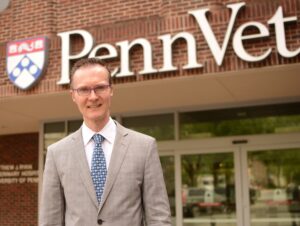Professor Oliver Garden, Henry and Corinne R Bower Professor of Medicine and Chair of the Department of Clinical Sciences & Advanced Medicine at the University of Pennsylvania (Penn Vet)

Can I ask you about the beginning of your career? You qualified as a vet at the RVC and intercalated with a degree in biomedical sciences with pharmacology and immunology. Is this where your interest in immunology first started?
It is certainly what provided me with an initial introduction to immunology. I intercalated when this was less commonly done than it is today because I wanted to make the most of the opportunity to carry out research, which I saw as allied but different from typical clinical veterinary medicine. After a rotating internship in small animal medicine and surgery, I carried out a Wellcome Trust-funded PhD with Professor Roger Batt on a dog model of gluten-sensitive enteropathy (coeliac disease). I loved gastroenterology and exploring how the gut interacts with food components and the microflora. This area of study also ultimately fuelled my interest in the immune system and autoimmune diseases, a passion that was cemented during my Wellcome Trust-funded Advanced Fellowship in Professor Sir Robert Lechler’s lab at the Hammersmith Campus of Imperial College London.
One of your PetSavers’ student grants investigated the role of hypoxia (low oxygen levels in tissues) in canine tumours and showed how it increased the infiltration of regulatory T cells, which are lymphoid cells that have a key role in immunosuppression and help prevent autoimmune disease. At the time this was seen as a novel finding in dogs; has it since been observed in humans?
Hypoxia is a major feature of tumours, seen in human cancers. It shapes the tumour microenvironment and is at least as important as cancer cells themselves in doing so. At Penn Vet, where I currently work, we are focusing on the function of regulatory T cells and myeloid-derived suppressor cells in regulating the immune response and in the pathogenesis of cancer and autoimmune disease. We use cells from dogs because canine diseases are great models for many human disorders, and studying them can help both species, which fits well with our One Health, One Medicine ethos. We also of course love dogs – and cats! Central to this ethos are several pivotal collaborations, such as those that exist between our lab and colleagues at Penn Vet, across all departments, and biomedical colleagues at Penn Medicine – to name just one of the external collaborations we enjoy in the local Penn community. Such collaborations are mutually beneficial in advancing each group’s own work.
As a veterinary researcher with experience of working and applying for research funding in the UK and the US, what are the benefits of PetSavers’ funding?
In both countries, many studies into veterinary research have to be justified by their impact on human health, particularly in order to receive larger funding grants. PetSavers’ grants are refreshing in that they offer the opportunity to enable research to be carried out in veterinary species for its own sake. They can also give students the opportunity to perform research who would not otherwise have been able to do so, which often has a transformative effect on their lives. Some of my students have gone on to have important careers in veterinary research, which were fuelled by their early experiences in studies funded by PetSavers. You do such great work – do please keep it up!
Tell us a little about your own experience. What does your research mean to you personally?
I’ve always been an impact-driven person. Up to about 5 years ago, I was driven by scientific curiosity, the fascination of discovery, and the desire to make an impact in my own lab with outputs such as publications and funding for pilot studies, or the training of individual students, undergraduate and postgraduate. Now, as Departmental Chair, I enjoy motivating and advancing the careers of the faculty and staff under my care, which helps me achieve a bigger impact than I could individually. Indeed, my biggest joy in life now is advancing the careers of others in my Department, of whom many are doing paradigm-shifting work that I can encourage, mentor, and facilitate in my current role. The central philosophy that guides my daily life, both at work and in my personal life, was espoused by Benjamin Franklin, founder of Penn, himself. He asked, simply: “The noblest question in the world is: What good may I do in it?”
What advice would you give to vets considering carrying out clinical research for the first time?
For those based at an academic institution, I would suggest talking to a mentor or collaborator who has already undertaken clinical research during their career. It is crucial to remember the importance of systems biology in understanding a research problem – an interdisciplinary approach is often key and no one person can do it all nowadays. Clinical research can be harder to perform in private practice, because of several logistical challenges and the inevitable tension that may exist between performing research and generating revenue, on which the practice survives. This is where collaborations can have such a big impact; indeed, some of my most rewarding and fruitful collaborations have been with vets in practice, who were driven by their altruistic wish to advance clinical medicine in veterinary species. Collaborations can particularly help those in practice who may not have the infrastructure in place to take into account factors like formal protocol approval, contingent on important ethical and scientific considerations. I would urge would-be researchers not to be intimidated by the process, but to seek help from those who offer complementary skills and the means of providing a new outlook for undertaking research. We all have a part to play – academics and private practitioners alike – and great collaborations can be so rewarding and productive, not to mention a lot of fun to boot!
